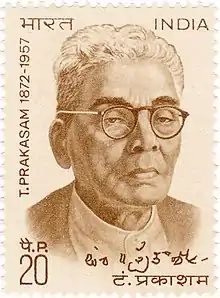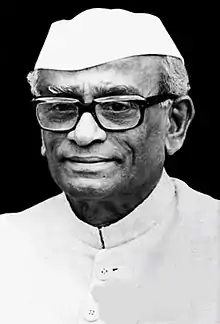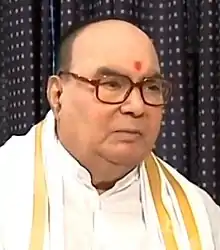| Chief Minister of Andhra Pradesh | |
|---|---|
| Āndhra Pradēś Mukhyamantri | |
| Chief Minister's Office | |
| Style | The Honourable (Formal) Mr./Mrs. Chief Minister (Informal) |
| Status | Head of Government |
| Abbreviation | CMoAP |
| Member of | Andhra Pradesh Legislature Andhra Pradesh Council of Ministers |
| Reports to | Governor of Andhra Pradesh |
| Seat | Andhra Pradesh Secretariat |
| Appointer | Governor of Andhra Pradesh |
| Term length | At the confidence of the assembly Chief minister's term is for five years and is subject to no term limits.[1] |
| Inaugural holder |
|
| Formation | 1 November 1956 |
| Deputy | Deputy Chief Minister of Andhra Pradesh |
| Website | Government of Andhra Pradesh |
The chief minister of Andhra Pradesh is the chief executive of the Indian state of Andhra Pradesh. In accordance with the Constitution of India, the governor is a state's de jure head, but de facto executive authority rests with the chief minister. Following elections to the Andhra Pradesh Legislative Assembly, the state's governor usually invites the party (or coalition) with a majority of seats to form the government. The governor appoints the chief minister, whose council of ministers are collectively responsible to the assembly. Given that he has the confidence of the assembly, the chief minister's term is for five years and is subject to no term limits.[1]
Since 1953, there have been 19 chief ministers with the majority of them belonging to the Indian National Congress party. In 1953, Tanguturi Prakasam became the first chief minister of the Andhra state. In 1956, Neelam Sanjeeva Reddy became the first chief minister of Andhra Pradesh post the re-organization of Indian states. The longest-serving chief minister was N. Chandrababu Naidu from Telugu Desam Party, who held the office for over thirteen years across multiple terms while N. Bhaskara Rao from the Congress had the shortest tenure of 31 days. Naidu was also the first chief minister of the state post the bifurcation of Telangana in 2014. Neelam Sanjeeva Reddy later became the President of India, while P. V. Narasimha Rao later became the Prime minister of India. There have been three instances of President's rule in Andhra Pradesh, most recently in 2014.
The current incumbent is Y. S. Jagan Mohan Reddy of the YSR Congress since 30 May 2019.
List of chief ministers
Andhra State
On 1 October 1953, 11 districts in the Telugu-speaking portion of Madras State became the new Andhra State with Kurnool as the capital. [2]
| # | Portrait | Chief Minister (Lifespan) Constituency |
Term of office | Election (Term) |
Party | Government | Appointed by (Governor) | |||
|---|---|---|---|---|---|---|---|---|---|---|
| 1 |  |
Tanguturi Prakasam (1913–1996) – |
1 October 1953 | 15 November 1954 | 1 year, 45 days | 1952 (1st) |
Indian National Congress | Prakasam | Chandulal Madhavlal Trivedi | |
| President's rule imposed during the period (15 November 1954 – 28 March 1955)[lower-alpha 1] | ||||||||||
| 2 | .png.webp) |
Bezawada Gopala Reddy (1913–1996) MLA for Atmakur |
28 March 1955 | 31 October 1956 | 1 year, 217 days | 1955 (2nd) |
Indian National Congress | Gopala | Chandulal Madhavlal Trivedi | |
Andhra Pradesh
On 1 November 1956, Government of India enacted the States Reorganisation Act, 1956 by which Hyderabad State ceased to exist with its Gulbarga and Aurangabad divisions merged into Mysore State and Bombay State respectively and remaining Telugu-speaking portion was merged with Andhra State to form the new state of Andhra Pradesh.[4] The state was further bifurcated into Andhra Pradesh and Telangana on 2 June 2014 by Andhra Pradesh Reorganisation Act, 2014 reducing the seats in the Andhra Pradesh Legislative Assembly from 294 to 175.[5]
| # | Portrait | Chief Minister (Lifespan) Constituency |
Term of office | Election (Term) |
Party | Government | Appointed by (Governor) | |||
|---|---|---|---|---|---|---|---|---|---|---|
| 1 |  |
Neelam Sanjiva Reddy (1913–1996) MLA for Srikalahasti |
1 November 1956 | 11 January 1960 | 3 years, 71 days | 1955 (1st) |
Indian National Congress | Neelam I | Chandulal Madhavlal Trivedi | |
| 1957 (2nd) |
Neelam II | |||||||||
| 2 | .jpg.webp) |
Damodaram Sanjivayya (1921–1972) MLA for Kurnool |
11 January 1960 | 12 March 1962 | 2 years, 60 days | Sanjivayya | Bhim Sen Sachar | |||
| (1) |  |
Neelam Sanjiva Reddy (1913–1996) MLA for Dhone |
12 March 1962 | 21 February 1964 | 1 year, 346 days | 1962 (3rd) |
Neelam III | |||
| 3 |  |
Kasu Brahmananda Reddy (1909–1994) MLA for Narasaraopet |
21 February 1964 | 30 September 1971 | 7 years, 221 days | Kasu I | Satyawant Mallannah Shrinagesh | |||
| 1967 (4th) |
Kasu II | Pattom A. Thanu Pillai | ||||||||
| 4 | (2).jpg.webp) |
Pamulaparthi Venkata Narasimha Rao (1921–2004) MLA for Manthani |
30 September 1971 | 10 January 1973 | 1 year, 102 days | 1972 (5th) |
Narasimha | Khandubhai Kasanji Desai | ||
| President's rule imposed during the period (11 January 1973 – 10 December 1973)[lower-alpha 1] | ||||||||||
| 5 | Jalagam Vengala Rao (1921–1999) MLA for Vemsoor |
10 December 1973 | 6 March 1978 | 4 years, 86 days | 1972 (5th) |
Indian National Congress | Jalagam | Khandubhai Kasanji Desai | ||
| 6 | .jpg.webp) |
Marri Chenna Reddy (1919–1996) MLA for Medchal |
6 March 1978 | 11 October 1980 | 2 years, 219 days | 1978 (6th) |
Marri I | Sharda Mukherjee | ||
| 7 | Tanguturi Anjaiah (1919–1986) MLC |
11 October 1980 | 24 February 1982 | 1 year, 136 days | Anjaiah | K. C. Abraham | ||||
| 8 | Bhavanam Venkatarami Reddy (1931–2002) MLC |
24 February 1982 | 20 September 1982 | 208 days | Bhavanam | |||||
| 9 | .jpg.webp) |
Kotla Vijaya Bhaskara Reddy (1920–2001) MLA for Kurnool |
20 September 1982 | 9 January 1983 | 111 days | Kotla I | ||||
| 10 |  |
Nandamuri Taraka Rama Rao (1923–1996) MLA for Tirupati |
9 January 1983 | 16 August 1984 | 1 year, 220 days | 1983 (7th) |
Telugu Desam Party | Rao I | ||
| 11 |  |
Nadendla Bhaskara Rao (born 1935) MLA for Vemuru |
16 August 1984 | 16 September 1984 | 31 days | Nadendla | Thakur Ram Lal | |||
| (10) |  |
Nandamuri Taraka Rama Rao (1923–1996) MLA for Tirupati 1984–1985 MLA for Hindupur 1985–1989 |
16 September 1984 | 9 March 1985 | 174 days | Rao I | Shankar Dayal Sharma | |||
| 9 March 1985 | 3 December 1989 | 4 years, 269 days | 1985 (8th) |
Rao II | ||||||
| (6) | .jpg.webp) |
Marri Chenna Reddy (1919–1996) MLA for Sanathnagar |
3 December 1989 | 17 December 1990 | 1 year, 14 days | 1989 (9th) |
Indian National Congress | Marri II | Kumudben Joshi | |
| 12 | .jpg.webp) |
Nedurumalli Janardhana Reddy (1935–2014) MLA for Venkatagiri |
17 December 1990 | 9 October 1992 | 1 year, 297 days | Janardhana | Krishan Kant | |||
| (9) | .jpg.webp) |
Kotla Vijaya Bhaskara Reddy (1920–2001) MLA for Panyam |
9 October 1992 | 12 December 1994 | 2 years, 64 days | Kotla II | ||||
| (10) |  |
Nandamuri Taraka Rama Rao (1923–1996) MLA for Hindupur |
12 December 1994 | 1 September 1995 | 263 days | 1994 (10th) |
Telugu Desam Party | Rao III | ||
| 13 | 1.jpg.webp) |
Nara Chandrababu Naidu (born 1950) MLA for Kuppam |
1 September 1995 | 11 October 1999 | 4 years, 40 days | Naidu I | ||||
| 11 October 1999 | 14 May 2004 | 4 years, 216 days | 1999 (11th) |
Naidu II | C. Rangarajan | |||||
| 14 | .jpg.webp) |
Yeduguri Sandinti Rajasekhara Reddy (1949–2009) MLA for Pulivendla |
14 May 2004 | 20 May 2009 | 5 years, 6 days | 2004 (12th) |
Indian National Congress | Reddy I | Surjit Singh Barnala | |
| 20 May 2009 | 2 September 2009 | 105 days | 2009 (13th) |
Reddy II | N. D. Tiwari | |||||
| 15 |  |
Konijeti Rosaiah (1933–2021) MLC |
3 September 2009 | 25 November 2010 | 1 year, 83 days | Konijeti | ||||
| 16 |  |
Nallari Kiran Kumar Reddy (born 1959) MLA for Pileru |
25 November 2010 | 1 March 2014 | 3 years, 96 days | Kiran | E. S. L. Narasimhan | |||
| President's rule imposed during the period (1 March 2014 – 7 June 2014)[lower-alpha 1][lower-alpha 2] | ||||||||||
| (13) |  |
Nara Chandrababu Naidu (born 1950) MLA for Kuppam |
8 June 2014 | 30 May 2019 | 4 years, 356 days | 2014 (14th) |
Telugu Desam Party | Naidu III | E. S. L. Narasimhan | |
| 17 |  |
Yeduguri Sandinti Jagan Mohan Reddy (born 1972) MLA for Pulivendla |
30 May 2019 | Incumbent | 4 years, 229 days | 2019 (15th) |
YSR Congress Party | Jagan | ||
See also
Notes
- 1 2 3 President's rule may be imposed when the "government in a state is not able to function as per the Constitution", which often happens because no party or coalition has a majority in the assembly. When President's rule is in force in a state, its council of ministers stands dissolved. The office of chief minister thus lies vacant, and the administration is taken over by the governor, who functions on behalf of the central government. At times, the legislative assembly also stands dissolved.[3]
- ↑ After 58 years, the state was bifurcated into Andhra Pradesh and Telangana states on 2 June 2014 by Andhra Pradesh Reorganisation Act, 2014. After state reorganisation Andhra Pradesh Sasana sabha seats come down from 294 to 175 seats.
References
- 1 2 Durga Das Basu. Introduction to the Constitution of India. 1960. 20th Edition, 2011 Reprint. pp. 241, 245. LexisNexis Butterworths Wadhwa Nagpur. ISBN 978-81-8038-559-9. Note: although the text talks about Indian state governments in general, it applies for the specific case of Andhra Pradesh as well.
- ↑ "Indian Express October 2, 1953". Retrieved 26 August 2013.
- ↑ Amberish K. Diwanji. "A dummy's guide to President's rule". Rediff.com. 15 March 2005.
- ↑ "Seventh Amendment, 1956". Government of India. Retrieved 19 November 2023.
- ↑ Gazette Notification of commencement (PDF) (Report). Government of India. Retrieved 5 March 2014.
- Amberish K. Diwanji. "A dummy's guide to President's rule". Rediff.com. 15 March 2005.
- Amberish K. Diwanji. "A dummy's guide to President's rule". Rediff.com. 15 March 2005.